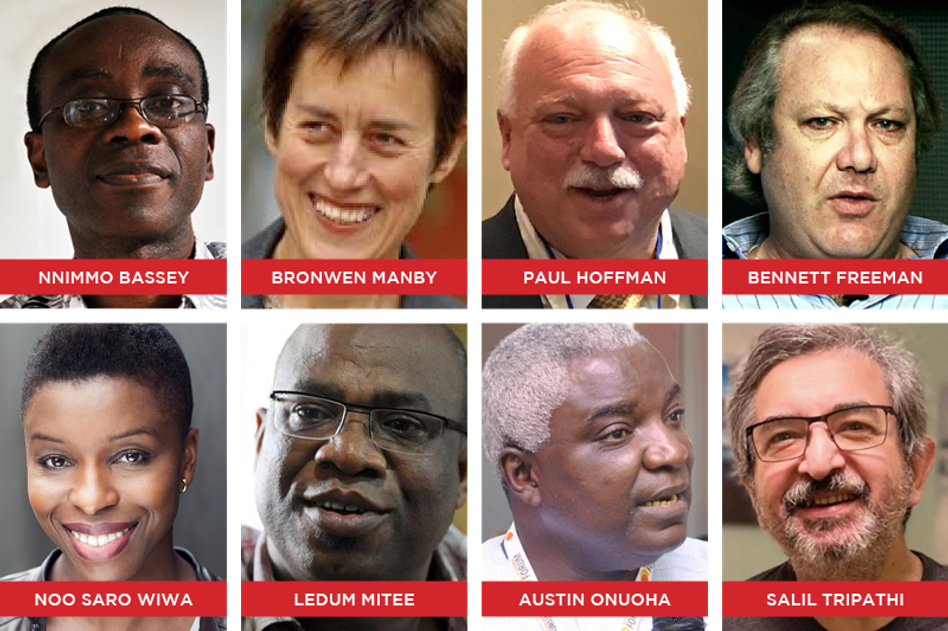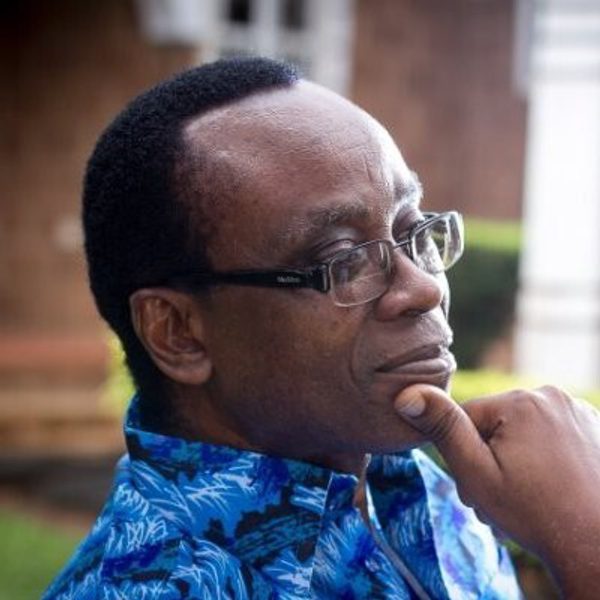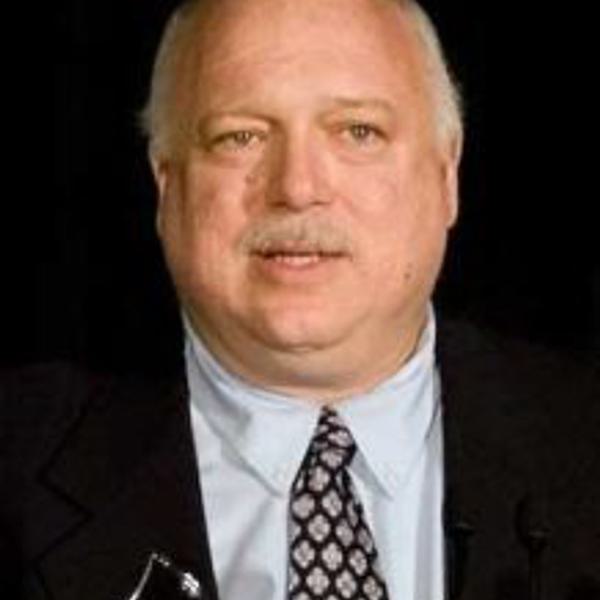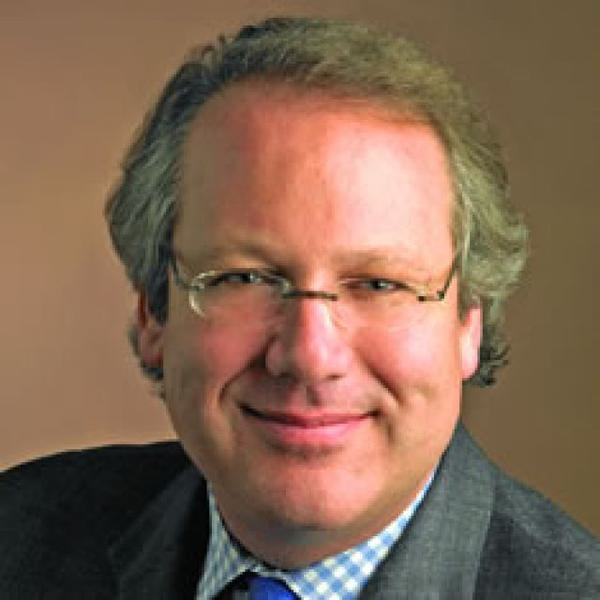On the Life and Legacy of Ken Saro Wiwa - The View from Beyond
10 November 2020
To mark the 25th year of the deaths of the Ogoni Nine - nine men who were executed by a brutal military regime in Nigeria in response to their activism against oil extraction in Ogoniland - IHRB presents a series of conversations about the significance of their struggle and impact of their leader Ken Saro Wiwa.
In this episode - The View from Beyond - Salil Tripathi speaks with Nnimmo Bassey, Rafto Laureate, human rights defender, poet, and environmental activist; Bronwen Manby who co-authored The Price of Oil, Human Rights Watch’s path-breaking research report on the violence in the Niger Delta; Paul Hoffman, who argued the Wiwa case before the US Supreme Court under the Alien Tort Statute; and Bennett Freeman, who was a senior US State Department official who brought together oil and mining companies, governments, and international human rights groups to prepare the Voluntary Principles for Security and Human Rights.
They discuss how the Ogoni struggle in Nigeria shaped the modern business and human rights movement; the litigations that followed; the lack of political and corporate accountability in an oil-rich nation where the military was a major factor, and; the state of human rights.
Stream above, or you can listen on your favourite podcast player.
If you care about human rights and are curious about the impact of business on peoples’ rights, then follow Voices to get each episode straight to your feed.
Background
On November 10th 1995, nine men from the Ogoni community - Ken Saro Wiwa, Barinem Kiobel, Saturday Dobee, Paul Levura, Nordu Eawo, Felix Nuate, Daniel Gbookoo, John Kpuinen, and Baribor Bera - were executed in Nigeria. They were charged with the murder of four Ogoni chiefs. US President Bill Clinton, UK Prime Minister John Major, South African President Nelson Mandela, and other international leaders and organisations including the Commonwealth, had appealed to Nigeria’s military dictator Sani Abacha, to prevent the carrying out of the executions. Artists and writers rallied, but to no avail. There was witness tampering and allegations of witnesses being bribed. The trial had a pre-determined outcome.
The Ogoni Nine, as these men came to be known as, were fighting oil companies in Ogoniland – notably Shell – because they were concerned about environmental degradation and pollution; they were alarmed by the use of security forces against non-violent protesters; and they were outraged over the corruption that drained Nigerian wealth (a problem that persists). Shell was criticised for its inaction but defended itself.
The executions shocked the international community. The cosmetics company Body Shop ran a spirited campaign for the Ogoni people. Amnesty International’s UK and Dutch sections began a dialogue with Shell, the culmination of which were Amnesty’s Human Rights Principles, which laid the foundation for similar conversations and approaches, eventually leading up to the mandate the UN Secretary General Kofi Annan created, of a Special Representative on Business and Human Rights, the role the Harvard professor John Ruggie played, who then consulted widely with businesses, governments, and the civil society and drafted the UN Guiding Principles for Business and Human Rights, which the UN Human Rights Council approved unanimously in 2011. The US Government worked with stakeholders and governments to initiate the Voluntary Principles for Security and Human Rights, aimed at ensuring that security forces comply with international human rights standards while protecting the people and assets of extractive industries. And the Extractive Industry Transparency Initiative was created to make companies investing in the extractive sector more transparent about how they shared revenues, paid taxes, and made contractual commitments with host nations. These significant developments would probably have occurred in any case, but the Ogoni case focused international attention to address the challenges posed by business to human rights.
To be sure, it was not a new story. Corporations have long-been intertwined with states and the consequences have often been adverse for human rights. Slavery was possible because of colonisation, and colonial powers took over vast territories ostensibly to trade but in reality to dominate countries and markets around the world; companies were willing accomplices in some cases, and standard-bearers in other cases. Many companies had colluded with repugnant regimes such as Germany during the Nazi years in the 1930s and 1940s and South Africa during the apartheid years that began in 1948 and ended in 1991. Industrial disasters like the gas leak in Bhopal, India, in 1984, killed thousands. In all those, and many other instances, including the way sweatshops operated in the developing world, business had a profoundly negative impact on human rights.
It was the case of the Ogoni people, of oil companies in the Niger Delta, which became the tipping point. Since then, there have been several initiatives that have aimed to address the injustices. Those are not sufficient, but they are necessary.

More in this series
As we mark the 25th year of the passing of the Ogoni Nine, IHRB’s Salil Tripathi (who has visited the Niger Delta in the past as researcher at Amnesty International and represented Amnesty at the drafting of the Voluntary Principles) presents a series of conversations about the significance of the struggle and impact of Ken Saro Wiwa and his allies:
- In The View from the Ground, Tripathi talks with Ledum Mitee, who was Saro-Wiwa’s lawyer, detained with him, and mobilised international opinion for the Ogoni people, Noo Saro-Wiwa, Ken’s daughter and distinguished writer based in London, and Austin Onuoha, a peace activist who works towards reconciliation in the Niger Delta.
- In The View from Beyond - Tripathi speaks with Nnimmo Bassey, Rafto Laureate, human rights defender, poet, and environmental activist; Bronwen Manby who co-authored The Price of Oil, Human Rights Watch’s path-breaking research report on the violence in the Niger Delta; Paul Hoffman, who argued the Wiwa case before the US Supreme Court under the Alien Tort Statute; and Bennett Freeman, who was a senior US State Department official who brought together oil and mining companies, governments, and international human rights groups to prepare the Voluntary Principles for Security and Human Rights.
- In The View from an Ally, Tripathi is joined by Richard Boele, now at KPMG in Sydney, who worked at Body Shop during the 1990s and lead a spirited corporate campaign for the Ogoni people prior to Ken's murder.








